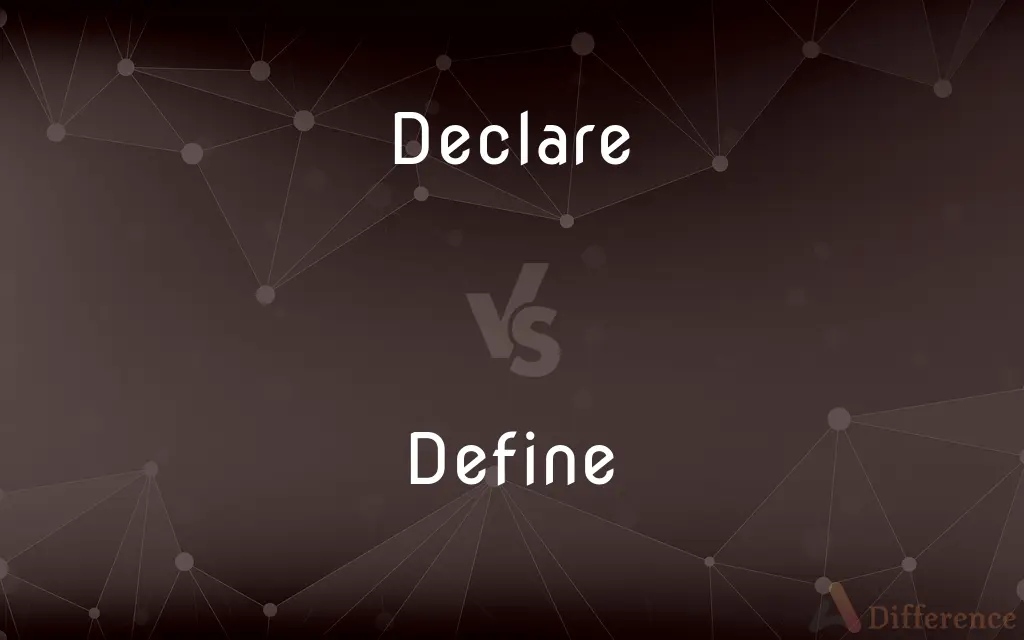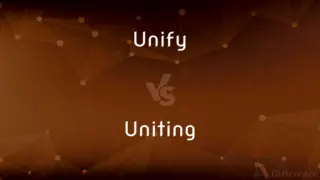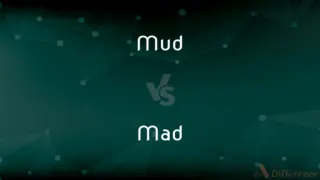Declare vs. Define — What's the Difference?
By Maham Liaqat & Urooj Arif — Updated on March 21, 2024
"Declare" involves stating or announcing something clearly, often in a formal context, while "define" means explaining the meaning of a word or concept, specifying its boundaries or essence.

Difference Between Declare and Define
Table of Contents
ADVERTISEMENT
Key Differences
When you "declare" something, you are making a formal announcement or stating something explicitly, often in a public or legal context. This action can involve proclaiming laws, intentions, or conditions, and is about communication or proclamation of a status or stance. On the other hand, "define" involves setting clear boundaries or meanings for terms, concepts, or phenomena. Defining something means providing its precise meaning, characteristics, or limitations, usually to clarify understanding or establish distinctions.
Declaring is an act that can affect perceptions, statuses, or legal standings, such as declaring independence or declaring a state of emergency. It implies a level of authority or intent to make something known to a wider audience. Whereas defining is more about delineation and explanation, focusing on elucidating the nature, scope, or essence of a concept or term. It is crucial in academic, technical, and everyday contexts to ensure mutual understanding and precise communication.
In programming, the difference becomes more technical: "declaring" a variable means stating that it exists and what type it is, without necessarily assigning it a value at that moment. Conversely, "defining" a variable or function involves actually assigning it a value or detailing the function's implementation, establishing its behavior or content.
The process of declaring often precedes actions or changes, serving as a preparatory or initiating step, such as declaring intentions before taking action. Defining, however, is about providing clarity and specificity to terms or concepts, which is foundational for understanding, discussion, and analysis.
Despite their differences, both declaring and defining are crucial for effective communication. Declaring can be seen as stating the existence or stance on something, while defining is concerned with elucidating the precise meaning or scope of a concept or term. The act of declaring might involve an element of defining if it includes clarifying what is being declared and the terms used in the declaration.
ADVERTISEMENT
Comparison Chart
Purpose
To announce or state something formally.
To explain the meaning or boundaries of something.
Context
Often used in legal, political, or formal settings.
Common in academic, technical, and everyday contexts.
Action
Making something known or establishing a status.
Providing clarity or explanation about a concept.
Focus
On the proclamation or announcement.
On meaning, characteristics, or limitations.
Example in Programming
Declaring a variable: specifying its type.
Defining a variable: assigning it a value.
Compare with Definitions
Declare
In programming, introducing a variable or function without assigning it a value.
Declaring an integer variable in C++: int myVariable;
Define
To describe the nature or characteristics of something.
The study defines the effects of diet on health.
Declare
Formal proclamation of a legal or official status.
The country declared independence on July 4th.
Define
To specify the meaning of a term or concept.
Dictionaries define words to ensure a shared understanding.
Declare
To announce one's intentions or decisions.
They declared their intention to run for office next year.
Define
To establish the limits or boundaries of something.
The treaty defines the border between the two nations.
Declare
To officially state or announce something.
The president declared a national emergency in response to the crisis.
Define
To clarify or make something understandable.
The teacher took time to define the key concepts of the lesson.
Declare
To make known one's position or opinion publicly.
The candidate declared his stance on environmental issues.
Define
In programming, to assign a value to a variable or detail a function's implementation.
Defining a function in Python: def myFunction():
Declare
Declare (2000) is a supernatural spy novel by American author Tim Powers. The novel presents a secret history of the Cold War, and earned several major fantasy fiction awards.
Define
State or describe exactly the nature, scope, or meaning of
The contract will seek to define the client's obligations
Declare
To make known formally or officially; proclaim
Declare that a fugitive has been captured.
Declare a mistrial.
Define
Mark out the boundary or limits of
The river defines the park's boundary
Declare
To state emphatically or authoritatively; affirm
"He wrote another prayer declaring that his conscience was weighed down with guilt" (Leo Damrosch).
Define
To state the precise meaning of (a word or sense of a word, for example).
Declare
To reveal or make manifest; show
His smile declared his agreement.
Define
To describe the nature or basic qualities of; explain
Define the properties of a new drug.
A study that defines people according to their median incomes.
Declare
To make a full statement of (dutiable goods, for example).
Define
To make clear the outline or form of; delineate
Gentle hills that were defined against the sky.
Declare
To designate (a trump suit or no-trump) with the final bid of a hand in bridge.
Define
To specify distinctly
Define the weapons to be used in limited warfare.
Declare
To reveal (a combination of cards) to be added to one's score.
Define
To give form or meaning to
"For him, a life is defined by action" (Jay Parini).
Declare
To make a declaration.
Define
To make or write a definition.
Declare
To announce one's intention to run for public office
"My gratitude would keep me loyal to McCarthy even after Bobby Kennedy declared for president" (James Carroll).
Define
To determine with precision; to mark out with distinctness; to ascertain or exhibit clearly.
The defining power of an optical instrument
Declare
To proclaim one's support, opposition, choice, or opinion
"The party ... has changed, openly declaring for centralized federal power" (Ronald Reagan).
Define
(obsolete) To settle, decide an argument etc.
Declare
To make clear, explain, interpret.
Define
To express the essential nature of something.
I define myself as a techno-anarchist.
Your past mistakes do not define who you are.
Declare
To assert or announce formally, officially, explicitly, or emphatically.
He declared him innocent.
Declare bankruptcy
Declare victory
Define
To state the meaning of a word, phrase, sign, or symbol.
The textbook defined speed as velocity divided by time.
Declare
(card games) To show one's cards in order to score.
Define
To describe, explain, or make definite and clear; used to request the listener or other person to elaborate or explain more clearly his or her intended meaning of a word or expression.
Person 1: Is she good at math?
Person 2: Define "good." If you mean if she is faster than the average middle schooler at multiplication, then yes. If you mean if she is able to do multivariable calculus, then no.
Person 2: Define "good." If you mean if she is faster than the average middle schooler at multiplication, then yes. If you mean if she is able to do multivariable calculus, then no.
Declare
For the captain of the batting side to announce the innings complete even though all batsmen have not been dismissed.
Define
To demark sharply the outlines or limits of an area or concept.
To define the legal boundaries of a property
Declare
For a constituency in an election to officially announce the result
Houghton and Sunderland South was the first constituency to declare in the 2015 general election.
Define
(mathematics) To establish the referent of a term or notation.
Declare
(transitive) To inform government customs or taxation officials of goods one is importing or of income, expenses, or other circumstances affecting one's taxes.
Define
(programming) A kind of macro in source code that replaces one text string with another wherever it occurs.
Declare
(transitive) To make outstanding debts, e.g. taxes, payable.
Define
To fix the bounds of; to bring to a termination; to end.
Declare
To explicitly establish the existence of (a variable, function, etc.) without necessarily describing its content.
The counter "i" was declared as an integer.
Define
To determine or clearly exhibit the boundaries of; to mark the limits of; as, to define the extent of a kingdom or country.
Declare
To make clear; to free from obscurity.
Define
To determine with precision; to mark out with distinctness; to ascertain or exhibit clearly; as, the defining power of an optical instrument.
Rings . . . very distinct and well defined.
Declare
To make known by language; to communicate or manifest explicitly and plainly in any way; to exhibit; to publish; to proclaim; to announce.
This day I have begot whom I declareMy only Son.
The heavens declare the glory of God.
Define
To determine the precise signification of; to fix the meaning of; to describe accurately; to explain; to expound or interpret; as, to define a word, a phrase, or a scientific term.
They define virtue to be life ordered according to nature.
Declare
To make declaration of; to assert; to affirm; to set forth; to avow; as, he declares the story to be false.
I the Lord . . . declare things that are right.
Define
To determine; to decide.
Declare
To make full statement of, as goods, etc., for the purpose of paying taxes, duties, etc.
Define
Give a definition for the meaning of a word;
Define `sadness'
Declare
To make a declaration, or an open and explicit avowal; to proclaim one's self; - often with for or against; as, victory declares against the allies.
Like fawning courtiers, for success they wait,And then come smiling, and declare for fate.
Define
Determine the essential quality of
Declare
To state the plaintiff's cause of action at law in a legal form; as, the plaintiff declares in trespass.
Define
Determine the nature of;
What defines a good wine?
Declare
State emphatically and authoritatively;
He declared that he needed more money to carry out the task he was charged with
Define
Delineate the form or outline of;
The tree was clearly defined by the light
The camera could define the smallest object
Declare
Announce publicly or officially;
The President declared war
Declare
State firmly;
He declared that he was innocent
Declare
Declare to be;
She was declared incompetent
Judge held that the defendant was innocent
Declare
Authorize payments of;
Declare dividends
Declare
Designate (a trump suit or no-trump) with the final bid of a hand
Declare
Make a declaration (of dutiable goods) to a customs official;
Do you have anything to declare?
Declare
Proclaim one's support, sympathy, or opinion for or against;
His wife declared at once for moving to the West Coast
Common Curiosities
Is declaring the same as announcing?
Yes, declaring often involves announcing something, but it typically carries a formal or official connotation.
Why is declaring important in legal contexts?
In legal contexts, declaring is crucial because it establishes official statuses, decisions, or conditions that have legal implications.
How does defining help in communication?
Defining helps in communication by ensuring that all parties have a mutual understanding of the terms and concepts being discussed.
Can defining include providing examples?
Yes, defining can include providing examples to clarify the term or concept further.
Can something be declared without being defined?
Yes, especially in programming and legal contexts, something can be declared (e.g., a variable's existence or an intent) without being fully defined or detailed at that moment.
Is it necessary to declare before you define in programming?
In many programming languages, declaring a variable before defining or initializing it is necessary, though some languages allow declaration and definition to occur simultaneously.
Can defining also imply limitations?
Yes, defining often involves setting boundaries or limitations for what a term or concept includes or excludes.
What does it mean to declare something?
Declaring something means making a formal or official statement about it, often publicly or in a legal context.
How do you define a term?
To define a term means to explain its meaning clearly and precisely, often specifying its boundaries or essence.
How does the process of defining affect learning?
Defining terms and concepts is foundational to learning because it builds the basis for understanding more complex ideas and discussions.
Why might a definition be subject to change?
Definitions can change due to evolving understandings, technological advancements, or shifts in societal norms and language use.
How do cultural contexts affect definitions?
Cultural contexts can influence definitions by shaping the understanding and significance of concepts, terms, and values differently across societies.
What's the difference between defining a variable and initializing it?
Defining a variable involves specifying its type and optionally assigning it an initial value, while initializing specifically refers to assigning a value at the time of definition.
What role does declaring play in programming?
In programming, declaring a variable or function specifies its existence and type within the scope, preparing it for use.
How do declarations affect international relations?
Declarations, such as those of independence or war, can significantly impact international relations by changing the legal and diplomatic status between entities.
Share Your Discovery

Previous Comparison
Unify vs. Uniting
Next Comparison
Mud vs. MadAuthor Spotlight
Written by
Maham LiaqatCo-written by
Urooj ArifUrooj is a skilled content writer at Ask Difference, known for her exceptional ability to simplify complex topics into engaging and informative content. With a passion for research and a flair for clear, concise writing, she consistently delivers articles that resonate with our diverse audience.















































